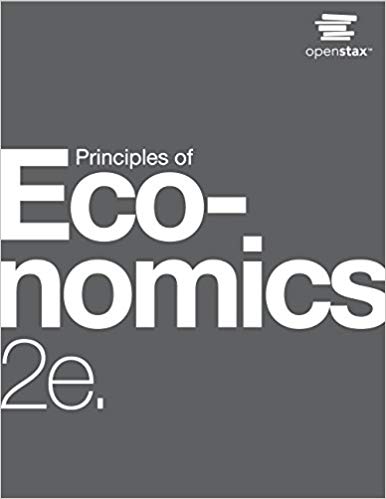Solutions for Principles of Economics 2e
Problem 1SCQ:
Suppose Alphonsos town raised the price of bus tickets to 1 per trip (while file price of burgers...Problem 2SCQ:
Return to the example in Figure 2.4. Suppose there is an improvement in medical technology that...Problem 3SCQ:
Could a nation be producing in a way that is allocatively efficient, but productively inefficient?Problem 4SCQ:
What are the similarities between a consumers budget constraint and societys production...Problem 5SCQ:
Individuals may not act in the rational, calculating way described by the economic model of decision...Problem 6SCQ:
Would an op-ed piece in a newspaper urging the adoption of a particular economic policy be a...Problem 7SCQ:
Would a research study on the effects of soft drink consumption on childrens cognitive development...Problem 8RQ:
Explain why scarcity leads to tradeoffs.Problem 9RQ:
Explain why individuals make Choices that are directly on the budget constraint, rather than inside...Problem 10RQ:
What is comparative advantage?Problem 12RQ:
Why is a production possibilities frontier typically drawn as a curve, rather than a straight line?Problem 13RQ:
Explain why societies cannot make a choice above their production possibilities frontier and should...Problem 14RQ:
What are diminishing marginal returns?Problem 15RQ:
What is productive efficiency? Allocative efficiency?Problem 17RQ:
Is the economic model of decision-making intended as a literal description of how individuals,...Problem 18RQ:
What are four responses to the claim that people should not behave in the way described in this...Problem 19CTQ:
Suppose Alphonsos town raises the price of bus tickets from 0.50 to 1 and file price of burgers...Problem 20CTQ:
During the Second World War, Germanys factories were decimated. It also suffered many human...Problem 21CTQ:
It is clear that productive inefficiency is a waste since resources are used in a way that produces...Problem 22CTQ:
What assumptions about the economy must he true for the invisible hand to work? To what extent are...Problem 23CTQ:
Do economists have any particular expertise at making normative arguments? In other words, they have...Problem 24P:
If the price of a magazine is 4 each, what is the maximum number of magazines she could buy in a...Problem 25P:
If the price of a pie is 12, what is the maximum number of pies she could buy in a week?Problem 26P:
Draw Maries budget constraint with pies on the horizontal axis and magazines on the vertical axis....Problem 27P:
What is Maries opportunity cost of purchasing a pie?Browse All Chapters of This Textbook
Chapter 1 - Welcome To Economics!Chapter 2 - Choice In A World Of ScarcityChapter 3 - Demand And SupplyChapter 4 - Labor And Financial MarketsChapter 5 - ElasticityChapter 6 - Consumer ChoicesChapter 7 - Production, Costs, And Industry StructureChapter 8 - Perfect CompetitionChapter 9 - MonopolyChapter 10 - Monopolistic Competition And Oligopoly
Chapter 11 - Monopoly And Antitrust PolicyChapter 12 - Environmental Protection And Negative ExternalitiesChapter 13 - Positive Externalities And Public GoodsChapter 14 - Labor Markets And IncomeChapter 15 - Poverty And Economic InequalityChapter 16 - Information, Risk, And InsuranceChapter 17 - Financial MarketsChapter 18 - Public EconomyChapter 19 - The Macroeconomic PerspectiveChapter 20 - Economic GrowthChapter 21 - UnemploymentChapter 22 - InflationChapter 23 - The International Trade And Capital FlowsChapter 24 - The Aggregate Demand/aggregate Supply ModelChapter 25 - The Keynesian PerspectiveChapter 26 - The Neoclassical PerspectiveChapter 27 - Money And BankingChapter 28 - Monetary Policy And Bank RegulationChapter 29 - Exchange Rates And International Capital FlowsChapter 30 - Government Budgets And Fiscal PolicyChapter 31 - The Impacts Of Government BorrowingChapter 32 - Macroeconomic Policy Around The WorldChapter 33 - International TradeChapter 34 - Globalization And ProtectionismChapter A - The Use Of Mathematics In Principles Of EconomicsChapter B - Indifference CurvesChapter D - The Expenditure-output Model
Sample Solutions for this Textbook
We offer sample solutions for Principles of Economics 2e homework problems. See examples below:
Chapter 1, Problem 1SCQChapter 2, Problem 1SCQChapter 3, Problem 1SCQChapter 4, Problem 1SCQChapter 5, Problem 1SCQChapter 6, Problem 1SCQChapter 7, Problem 1SCQChapter 8, Problem 1SCQChapter 9, Problem 1SCQ
Chapter 10, Problem 1SCQChapter 11, Problem 1SCQChapter 12, Problem 1SCQChapter 13, Problem 1SCQChapter 14, Problem 1SCQChapter 15, Problem 1SCQChapter 16, Problem 1SCQChapter 17, Problem 1SCQChapter 18, Problem 1SCQChapter 19, Problem 1SCQChapter 20, Problem 1SCQChapter 21, Problem 1SCQChapter 22, Problem 1SCQChapter 23, Problem 1SCQChapter 24, Problem 1SCQChapter 25, Problem 1SCQChapter 26, Problem 1SCQChapter 27, Problem 1SCQChapter 28, Problem 1SCQChapter 29, Problem 1SCQChapter 30, Problem 1SCQChapter 31, Problem 1SCQChapter 32, Problem 1SCQChapter 33, Problem 1SCQChapter 34, Problem 1SCQChapter A, Problem 1RQChapter B, Problem 1RQChapter D, Problem 6RQ
More Editions of This Book
Corresponding editions of this textbook are also available below:
Principles Of Economics V8.0
18th Edition
ISBN: 9781453384503
Principles Of Economics 2e
2nd Edition
ISBN: 9781680920864
PRINCIPLES OF ECONOMICS (OER)
2nd Edition
ISBN: 9781947172371
PRINCIPLES OF ECONOMICS
14th Edition
ISBN: 2810015433483
PRINCIPLES OF ECONOMICS (OER)
19th Edition
ISBN: 9781506698137
Prin.of Economics
4th Edition
ISBN: 9780996996310
PRIN.OF ECONOMICS (B+W,PB)
5th Edition
ISBN: 9780996095419
PRIN.OF ECONOMICS (COLOR,PB)
5th Edition
ISBN: 9781930789968
PRINCIPLES OF ECONOMICS FLATWORLD
9th Edition
ISBN: 9781453339176
Principles of Economics
16th Edition
ISBN: 9781938168239
PRIN.OF ECONOMICS
7th Edition
ISBN: 9780538453592
PRINCIPLES OF ECONOMICS (OER)>CUSTOM<
18th Edition
ISBN: 9781947172289
Related Economics Textbooks with Solutions
Still sussing out bartleby
Check out a sample textbook solution.
